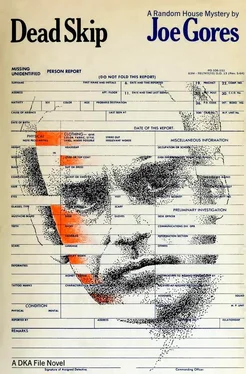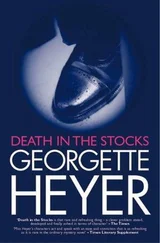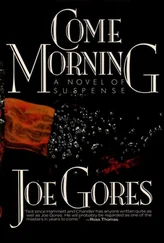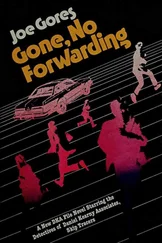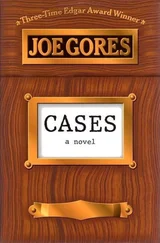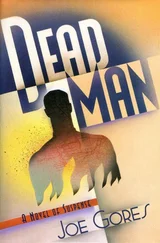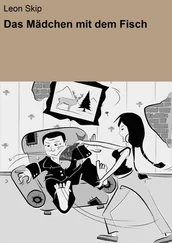Джо Горес - Dead skip
Здесь есть возможность читать онлайн «Джо Горес - Dead skip» весь текст электронной книги совершенно бесплатно (целиком полную версию без сокращений). В некоторых случаях можно слушать аудио, скачать через торрент в формате fb2 и присутствует краткое содержание. Город: New York, Год выпуска: 1972, ISBN: 1972, Издательство: Random House, Жанр: Детектив, на английском языке. Описание произведения, (предисловие) а так же отзывы посетителей доступны на портале библиотеки ЛибКат.
- Название:Dead skip
- Автор:
- Издательство:Random House
- Жанр:
- Год:1972
- Город:New York
- ISBN:978-0-394-48157-9
- Рейтинг книги:4 / 5. Голосов: 1
-
Избранное:Добавить в избранное
- Отзывы:
-
Ваша оценка:
- 80
- 1
- 2
- 3
- 4
- 5
Dead skip: краткое содержание, описание и аннотация
Предлагаем к чтению аннотацию, описание, краткое содержание или предисловие (зависит от того, что написал сам автор книги «Dead skip»). Если вы не нашли необходимую информацию о книге — напишите в комментариях, мы постараемся отыскать её.
Dead skip — читать онлайн бесплатно полную книгу (весь текст) целиком
Ниже представлен текст книги, разбитый по страницам. Система сохранения места последней прочитанной страницы, позволяет с удобством читать онлайн бесплатно книгу «Dead skip», без необходимости каждый раз заново искать на чём Вы остановились. Поставьте закладку, и сможете в любой момент перейти на страницу, на которой закончили чтение.
Интервал:
Закладка:
Eighteen
At exactly 7:07 P.M., a black hand jerked convulsively on the white sheet. Corinne Jones’ head snapped up, her mouth popped open in excitement and disbelief. It had been sixty-six hours.
Heslip sighed, stirred, tried to roll over. Corinne was already clawing the bell at the head of the bed which was to bring the nurse. It did, fast. And the doctor.
Heslip moaned, made a sort of clucking sound in his throat, and began a regular even grating sound. The little mod medic, Whitaker, far from being alarmed at the sound, seemed delighted. He laid a hand on Corinne’s arm in a gesture that should have been avuncular but which somehow came off closer to a caress. He chuckled softly.
Bart Heslip had started to snore.
At exactly 7:07 P.M., Dan Kearny drove down Mount Diablo Street in Concord. The sun had another hour of Daylight Saving, but it was low and its light was pink-tinged. The shadows it now cast were long and thin, unlike the round fat ones Ballard had found earlier.
Kearny went a full block beyond the house before U-turning, and parked far enough down the street so his car would be out of sight. He ambled slowly back, tasting the neighborhood. Small one-stories built as veterans’ dream homes after World War II. Still bungalows then, instead of the pervasive California ranch style.
In front of the house next door, Kearny paused to pat a mongrel pup that had cantered up with unsuspicious puppy friendliness. Kearny’s hard gray eyes roamed the street, the setup at the Beaghler house.
There were too many cars parked in front of it. Five of them.
The red and white Olds compact convertible in the driveway — Sharon’s car, of course. A dusty black Chevy Nova with the slightly splay-footed stance that too-wide tires give small cars. Beaghler’s. Probably jazzed-up to get out and move, a useful trait for a number of things both legal and illegal.
Kearny thumped the dog in the ribs. The dog loved it. Looking too hard for illegal setups today? No. There were those extra cars outside Beaghler’s house. Three of them. And they were all wrong.
What about people over to supper? Ballard’s description of the living room said no. Even crappy housekeepers clean up for company. But what about an early poker game with the boys? That was a possibility — what did men care about housekeeping as long as the beer held out? Yes, a good possibility. Except.
Except that Kearny knew damned near everything there was to know about cars. Not just how to open them without keys, or run them without switching on the ignition. Everything. And just driving by those three late-model sedans, all with California plates, all recently washed, he had spotted the odd fact about them.
All three were rental cars.
He gave the dog a final friendly thump, went by the cars toward the house. Check. Each had the unobtrusive Dymo-printed adhesive tab used to identify rental vehicles. Rear bumper. Lower left-hand corner of the windshield. Back of the rear-view mirror.
Which meant three different rental companies.
Picking his way across the overgrown yard, Kearny tried to come up with a legitimate explanation. Friends coming in from out of state. Then why three different companies? Family reunion, people coming in at different times from different places. On a weekday? A business conference. That could explain the cars; coincidence could explain the choice of three different rent-a-car companies. It also could explain the poker table. A conference, not cards.
But how many business conferences with out-of-state associates did an auto mechanic living in a twenty-five-year-old $18,000 tract home have? Legitimate business conferences?
Kearny rang the bell.
He stood turned slightly from the door, the perfect picture of a bored salesman or house-to-houser. Then the door opened, and Kearny immediately recast his role.
This man had never been an auto mechanic, or a homeowner, or would have worked for anyone else. He was wide and blocky, with flat square shoulders, a good half-head taller than Kearny’s five-nine. His hands were out of a foundry, his wrists roped with veins. His face was bony, as flat and hard as the shoulders, rough-hewn in the same foundry as the hands.
He didn’t say anything, he didn’t have to. He confirmed what the clustered rental cars suggested, and made it even more certain by stepping out on the porch and closing the door firmly behind him.
Kearny had to make the motions, anyway. “Mr. Beaghler?”
“No.” Just a monosyllable, nothing more.
“How about the little lady of the house? Is Mrs. Beaghler—”
“No.”
“You mean she isn’t here at the present time, or that—”
“I already said no.”
The big catlike man reached behind him without looking, twisted the knob, started to slide through the door sideways and back in, automatically not letting Kearny see into the house. As he automatically had stepped outside the door and shut it behind him, just in case Kearny had been fuzz. Once you let a cop in, he was in. If you came out to him and shut the door, then he needed a warrant to go through it.
Until Kearny spoke, he had no idea he was going to; the face was totally unfamiliar. But something in his computer mind, programed by a quarter-century of investigations to indelibly retain detail, because detail so often broke cases, had recognized those hands, the ears set flat to the square skull, the black dry hair, the voice. Even though it had been a single night ten years before.
“Parker,” he said.
The door stopped closing. Eyes of flawed onyx regarded him thoughtfully. Kearny wished he had broken his own rule about carrying the S&W four-inch .41 Magnum for which he had a permit. The thoughts behind those eyes made a gun seem a comforting idea.
“What did you call me?”
“Parker.”
“You’re making a mistake,” he said flatly. Whether the mistake was in the name or in using the name wasn’t clear. “The name is Latham.”
Kearny allowed himself a shrug. “It was Parker in 1962. You’ve gotten a new face since then, but the rest is the same.”
Then he saw the recognition in the eyes, in the slight relaxation of the tough, muscle-roped body.
“My name’s Kearny,” he went on. “You were vagged in Bakersfield, broke out of the prison farm. A woman from Fresno gave you a ride, ended up taking you home with her for a two-day shack-up while the heat died down. You never told her you were the one they wanted, but she knew. She didn’t care. She was my wife’s sister. I stayed at the house the second night. We killed a bottle between us.”
The big man came back out on the porch. His eyes were still watchful, but not at the moment murderous. “I was Ronald Casper then.”
“She heard you telephoning a guy in Chicago, collect. He wouldn’t accept a call from Casper, you had to use the name Parker. She told me about it afterwards, after you left. She still talks about you. I never told her she was just an easy way for you to be off the street for a couple of days.”
Parker shrugged; he didn’t seem to care about that. He said, “So what is it now?”
“I’m looking for a paroled con named Howard Odum.”
The big man waited, perfectly still, perfectly relaxed, totally dangerous. Thoughts moved behind the stony eyes. He said, “Odum is a friend of Beaghler’s?”
“Was. Friend of the wife’s now. Beaghler doesn’t know.” Kearny added carefully, “This has nothing to do with anything Beaghler’s into now.”
Parker decided. He opened the door enough to stick his head in and call. “Sharon.”
In a few moments the woman Ballard had described came out. She carelessly let the door swing wide enough to give Kearny a glimpse of at least three more men in the living room. The plunder squad. Parker shut the door again.
Читать дальшеИнтервал:
Закладка:
Похожие книги на «Dead skip»
Представляем Вашему вниманию похожие книги на «Dead skip» списком для выбора. Мы отобрали схожую по названию и смыслу литературу в надежде предоставить читателям больше вариантов отыскать новые, интересные, ещё непрочитанные произведения.
Обсуждение, отзывы о книге «Dead skip» и просто собственные мнения читателей. Оставьте ваши комментарии, напишите, что Вы думаете о произведении, его смысле или главных героях. Укажите что конкретно понравилось, а что нет, и почему Вы так считаете.
